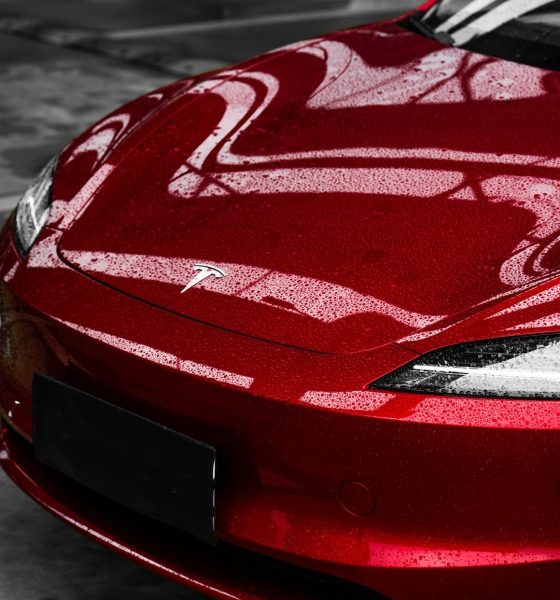

Investor's Corner
Tesla billionaire investor Ron Baron supports ratification of Musk’s 2018 pay package
Legendary investor Ron Baron has noted that he would be voting in favor of the ratification of Elon Musk’s 2018 CEO Performance Award. Baron’s rationale behind his vote was highlighted in an open letter and discussed in a segment on CNBC’s Squawk Box.
In his open letter, Baron noted that Musk’s 2018 compensation package included aggressive performance metrics that — at the time when the CEO Performance Award was approved — few believed were possible. Baron highlighted that had Musk not met his very aggressive performance goals, he would have received nothing from the electric vehicle maker.
However, since he achieved his performance goals as Tesla’s CEO, shareholders should honor Musk’s pay package. He also noted that he believes Tesla has the potential to grow even more in the years to come. “When the contract was signed, the company’s market value was $53 billion. It got as high as a trillion, and it’s now $550 billion. I think in the next ten years, we’ll make 4-5 times our money again in Tesla,” Baron noted.
Ron Baron supporting @elonmusk this morning on cnbc @BaronCapital $tsla vote your shares!!!! pic.twitter.com/jwZk3nvZqd— Jim Hall (@jhall) June 5, 2024
Following is Baron’s open letter in support of Musk’s 2018 compensation plan.
Baron Capital supports Elon Musk’s 2018 compensation contract for the following reasons:
In 2018, 73% of Tesla’s disinterested shareholders voted in support of Elon’s compensation contract. The will of those owners of the company should be honored. The contractual agreement between the company and Elon should be honored. The voice of shareholders and legally binding contracts should not be permitted to be undone by a shareholder for hire and his strike suit lawyers. The plaintiff shareholder in question owned nine (9) Tesla shares, and the lawyers who represented him have requested they be awarded $5.6 billion in fees! Further, the plaintiff’s lawyers requested their fees be paid in Tesla shares…after its stock price has been depressed by this controversy! Does anyone honestly believe the motivation of the plaintiff and his lawyers was to serve the best interests of Tesla and its shareholders?
Elon’s compensation contract contained aggressive performance metrics that few in 2018 believed could be achieved. If these aggressive performance metrics had not been achieved, Elon would have received nothing. When Tesla achieved targeted earnings, revenues, and market cap metrics, Tesla’s shareholders benefitted greatly. Tesla’s market cap when Elon’s pay package was approved on March 21, 2018 was $53.5 billion. It is approximately $550.75 billion today, after having reached a high watermark of $1.24 trillion in November of 2021. He performed under his compensation contract. He earned his pay.
Elon is the ultimate “key man” of key man risk. Without his relentless drive and uncompromising standards, there would be no Tesla. Especially considering how he slept on the floor of Tesla’s Fremont factory when the company was going through what he called “production hell!”
If shareholders want to protect and grow their investment, they must AGAIN approve his compensation contract.
Shareholders should ask themselves this question: is Tesla better off with or without Elon…whom we believe is the reason 6 million people applied for 12,000 jobs last year to work with this extraordinary individual. Because that is what is at stake. At Baron Capital, our answer is clear, loud, and unequivocal: Tesla is better with Elon.
Tesla is Elon.
Ron
June 4, 2024
Ron Baron’s full open letter in support of Elon Musk’s 2018 CEO Performance Award can be fully viewed below.
Baron Capital Tesla Elon Musk Compensation 6.5.2024 by Simon Alvarez on Scribd
Don’t hesitate to contact us with news tips. Just send a message to simon@teslarati.com to give us a heads up.

Elon Musk
Tesla stock gets latest synopsis from Jim Cramer: ‘It’s actually a robotics company’
“Turns out it’s actually a robotics and Cybercab company, and I want to buy, buy, buy. Yes, Tesla’s the paper that turned into scissors in one session,” Cramer said.

Tesla stock (NASDAQ: TSLA) got its latest synopsis from Wall Street analyst Jim Cramer, who finally realized something that many fans of the company have known all along: it’s not a car company. Instead, it’s a robotics company.
In a recent note that was released after Tesla reported Earnings in late January, Cramer seemed to recognize that the underwhelming financials and overall performance of the automotive division were not representative of the current state of affairs.
Instead, we’re seeing a company transition itself away from its early identity, essentially evolving like a caterpillar into a butterfly.
The narrative of the Earnings Call was simple: We’re not a car company, at least not from a birds-eye view. We’re an AI and Robotics company, and we are transitioning to this quicker than most people realize.
Tesla stock gets another analysis from Jim Cramer, and investors will like it
Tesla’s Q4 Earnings Call featured plenty of analysis from CEO Elon Musk and others, and some of the more minor details of the call were even indicative of a company that is moving toward AI instead of its cars. For example, the Model S and Model X will be no more after Q2, as Musk said that they serve relatively no purpose for the future.
Instead, Tesla is shifting its focus to the vehicles catered for autonomy and its Robotaxi and self-driving efforts.
Cramer recognizes this:
“…we got results from Tesla, which actually beat numbers, but nobody cares about the numbers here, as electric vehicles are the past. And according to CEO Elon Musk, the future of this company comes down to Cybercabs and humanoid robots. Stock fell more than 3% the next day. That may be because their capital expenditures budget was higher than expected, or maybe people wanted more details from the new businesses. At this point, I think Musk acolytes might be more excited about SpaceX, which is planning to come public later this year.”
He continued, highlighting the company’s true transition away from vehicles to its Cybercab, Optimus, and AI ambitions:
“I know it’s hard to believe how quickly this market can change its attitude. Last night, I heard a disastrous car company speak. Turns out it’s actually a robotics and Cybercab company, and I want to buy, buy, buy. Yes, Tesla’s the paper that turned into scissors in one session. I didn’t like it as a car company. Boy, I love it as a Cybercab and humanoid robot juggernaut. Call me a buyer and give me five robots while I’m at it.”
Cramer’s narrative seems to fit that of the most bullish Tesla investors. Anyone who is labeled a “permabull” has been echoing a similar sentiment over the past several years: Tesla is not a car company any longer.
Instead, the true focus is on the future and the potential that AI and Robotics bring to the company. It is truly difficult to put Tesla shares in the same group as companies like Ford, General Motors, and others.
Tesla shares are down less than half a percent at the time of publishing, trading at $423.69.
Elon Musk
Tesla to a $100T market cap? Elon Musk’s response may shock you

There are a lot of Tesla bulls out there who have astronomical expectations for the company, especially as its arm of reach has gone well past automotive and energy and entered artificial intelligence and robotics.
However, some of the most bullish Tesla investors believe the company could become worth $100 trillion, and CEO Elon Musk does not believe that number is completely out of the question, even if it sounds almost ridiculous.
To put that number into perspective, the top ten most valuable companies in the world — NVIDIA, Apple, Alphabet, Microsoft, Amazon, TSMC, Meta, Saudi Aramco, Broadcom, and Tesla — are worth roughly $26 trillion.
Will Tesla join the fold? Predicting a triple merger with SpaceX and xAI
Cathie Wood of ARK Invest believes the number is reasonable considering Tesla’s long-reaching industry ambitions:
“…in the world of AI, what do you have to have to win? You have to have proprietary data, and think about all the proprietary data he has, different kinds of proprietary data. Tesla, the language of the road; Neuralink, multiomics data; nobody else has that data. X, nobody else has that data either. I could see $100 trillion. I think it’s going to happen because of convergence. I think Tesla is the leading candidate [for $100 trillion] for the reason I just said.”
Musk said late last year that all of his companies seem to be “heading toward convergence,” and it’s started to come to fruition. Tesla invested in xAI, as revealed in its Q4 Earnings Shareholder Deck, and SpaceX recently acquired xAI, marking the first step in the potential for a massive umbrella of companies under Musk’s watch.
SpaceX officially acquires xAI, merging rockets with AI expertise
Now that it is happening, it seems Musk is even more enthusiastic about a massive valuation that would swell to nearly four-times the value of the top ten most valuable companies in the world currently, as he said on X, the idea of a $100 trillion valuation is “not impossible.”
It’s not impossible
— Elon Musk (@elonmusk) February 6, 2026
Tesla is not just a car company. With its many projects, including the launch of Robotaxi, the progress of the Optimus robot, and its AI ambitions, it has the potential to continue gaining value at an accelerating rate.
Musk’s comments show his confidence in Tesla’s numerous projects, especially as some begin to mature and some head toward their initial stages.
Elon Musk
Tesla director pay lawsuit sees lawyer fees slashed by $100 million
The ruling leaves the case’s underlying settlement intact while significantly reducing what the plaintiffs’ attorneys will receive.

The Delaware Supreme Court has cut more than $100 million from a legal fee award tied to a shareholder lawsuit challenging compensation paid to Tesla directors between 2017 and 2020.
The ruling leaves the case’s underlying settlement intact while significantly reducing what the plaintiffs’ attorneys will receive.
Delaware Supreme Court trims legal fees
As noted in a Bloomberg Law report, the case targeted pay granted to Tesla directors, including CEO Elon Musk, Oracle founder Larry Ellison, Kimbal Musk, and Rupert Murdoch. The Delaware Chancery Court had awarded $176 million to the plaintiffs. Tesla’s board must also return stock options and forego years worth of pay.
As per Chief Justice Collins J. Seitz Jr. in an opinion for the Delaware Supreme Court’s full five-member panel, however, the decision of the Delaware Chancery Court to award $176 million to a pension fund’s law firm “erred by including in its financial benefit analysis the intrinsic value” of options being returned by Tesla’s board.
The justices then reduced the fee award from $176 million to $70.9 million. “As we measure it, $71 million reflects a reasonable fee for counsel’s efforts and does not result in a windfall,” Chief Justice Seitz wrote.
Other settlement terms still intact
The Supreme Court upheld the settlement itself, which requires Tesla’s board to return stock and options valued at up to $735 million and to forgo three years of additional compensation worth about $184 million.
Tesla argued during oral arguments that a fee award closer to $70 million would be appropriate. Interestingly enough, back in October, Justice Karen L. Valihura noted that the $176 award was $60 million more than the Delaware judiciary’s budget from the previous year. This was quite interesting as the case was “settled midstream.”
The lawsuit was brought by a pension fund on behalf of Tesla shareholders and focused exclusively on director pay during the 2017–2020 period. The case is separate from other high-profile compensation disputes involving Elon Musk.








